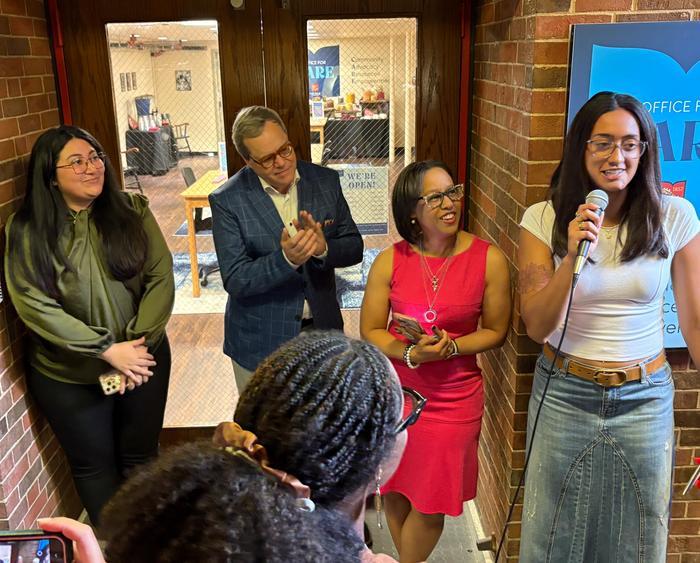Office for CARE opens at Lake Forest College
 CARE's ribbon-cutting ceremony took place August 25, 2025.
CARE's ribbon-cutting ceremony took place August 25, 2025.
Community. Advocacy. Resources. Empowerment. These are the core pillars that drive the work of the College's new Office for CARE, which opened on August 25.
Located in the lower level of the Mohr Student Center, the recently renovated Office for Community, Advocacy, Resources, and Empowerment (CARE) still smells of fresh paint. Both spacious and cozy, the office has cultivated an inviting atmosphere. This welcoming atmosphere is crucial to CARE's work.
CARE aims to be a space of support, connection, and transformation for students, faculty, and staff. Through programming, education, and responsive support, the office works to eliminate barriers, address systemic inequities, and build a community that honors the dignity and unique contributions of all its members.
“We hope people will see us as a resource,” Interim Associate Vice President for CARE Kim Davis, EdD, shared. “If you're not sure where to go, we will point you in the right direction. See us as a collaborator for thoughtful conversations.”

The Office of CARE seeks not to be the owners of this space, but the facilitators of belonging and inclusion across campus.
CARE is digging into research around inclusion, diversity, equity, and access. The CARE staff, including Associate Director for CARE Alice Fermaintt, plan to integrate this research in the College's programming and decision making.
“We're looking to engrain this work in everything we do as an institution,” Davis said. “It's not a one off. It's not a side department. We are building inroads for all of us as a community to create a Forester community where everyone belongs and everyone feels seen and heard and valued.”

The efforts of the Office for CARE are rooted in the belief that a thriving campus requires intentional spaces where people feel valued, heard, and equipped to lead with empathy and purpose. Davis's past experiences inform this approach.
“Most of my academic and work experience has been in predominately white spaces. And often, I found myself searching to find spaces where I felt could feel safe, seen, and supported,” she shared. “I was searching to find people that I felt safe with.”
Davis has spent much of her career exploring the experiences of Black women in predominantly white spaces. Her current research examines how integrating artistic practices into communities can foster communities of practice that, in turn, open pathways to deeper belonging.

CARE will partner across the College to offer initiatives that are both proactive and healing—ranging from inclusive leadership development and identity-affirming gatherings to workshops that foster skill-building, cultural humility, and mutual accountability.
“We will have a slate of offerings along with an open invitation for people to hang out here, do their homework, or eat lunch,” Davis said. “The one thing I really want to impress on everyone is that it's not just a student space, but a space for everyone on campus. Check out our resource library, come have lunch, hang in our cozy corner. You are welcome to come take part.”

